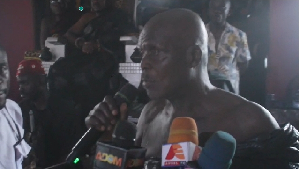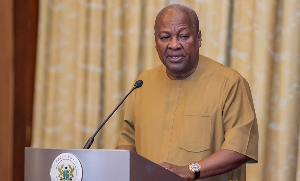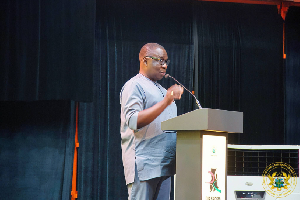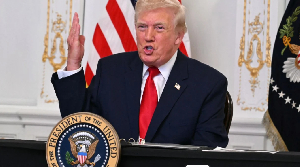Asks Joe Kingsley Eyiah, OCT, Brookview Middle School, Toronto-Canada
Ghana, a promising nation on the continent of Africa, this month celebrated its 53rd year of independence from colonial rule. On March 6, 1957, Ghana under its 1st Prime Minister and later President, Osagyefo Dr. Kwame Nkrumah of blessed memory, was granted independence from the then British colonial rule. Since then, this glamorous nation of hospitable people has seen its ups and downs at all levels of national development, including education.
Undoubtedly, education is the biggest enterprise in any civilized society. Granted the fact that education is one of the most important tool for national development it becomes the responsibility of any progressive government anywhere to provide and promote sound educational policies as well as infrastructure that will help its people to acquire knowledge, skills and attitudes that enable them to develop their potentials. The founding President of Ghana, Dr. Nkrumah understood this very well. He therefore expanded the opportunities for all Ghanaians to have some education. There was the mass education for adult Ghanaians who were above school-going age. More importantly, the formal sector of education in Ghana then saw rapid development under President Nkrumah.
The History of Formal Education in Ghana:
Research shows that, “Formal education in Ghana preceded colonization. The first schools were established by European merchants and missionaries. During the colonial period, a formal state education structure was modeled on the British system. This structure has been through a series of reforms since Ghana gained its independence in 1957. In the 1980s, further reforms have brought the structure of the education system closer to an American model.
“The first nationalist government, headed by Dr. Nkrumah, initiated an accelerated plan for education. With legislation, he made primary education free and compulsory. Before this time, most of the schools belonged to religious bodies or the communities themselves and parents paid for school. Government took over the management of schools. The 1961 Education Act made elementary schools (junior secondary or middle) free and compulsory. Students began their 6 year primary education at the age of six. They then moved on to 4 years elementary/middle school. They then moved on to a 5 years secondary education, followed by 2 years of college preparatory education. It took 17 years to complete the pre-university education, however, some were allowed to complete it earlier, if they were academically ready. At the time of independence in 1957, Ghana had only one university and a handful of secondary and primary schools.” During the early 1960s, more secondary schools and teacher training colleges were opened in Ghana. Many Ghanaians took advantage of this rapid development in formal education to educate themselves for better employment. The Kumasi College of Technology founded in 1952 was upgraded to full University status in 1961 to enhance technical & vocational education at the highest level in Ghana. Also, the Winneba Party College was converted to Kwame Nkrumah Ideological Institute to cater for studies in Economics and Political Science by some selected dedicated members of all nationalist movements of Africa. Ghana's educational System became highly centralized with the Ministry of Education and its agencies being responsible for the entire educational system in the country. The Ghana Education Service was established to oversee the implementation of educational policies introduced by the Ministry of Education. The Government became the sole provider of education edging out most private schools established by religious missions in the country before independence.
After Dr. Nkrumah’s Era:
Though a new education committee under Professor Kwapong was appointed immediately after the overthrow of Dr. Kwame Nkrumah in 1966 to fix the weakness in Ghana’s education, at the close of the 1970s, Ghana’s education could only be described as ‘decayed’ and needed organic rejuvenation. The decay was a result of political instability with its resulting poor management, corruption, and general macroeconomic turmoil (Mfum-Mensah, 1998).
Standards of education started declining as public schools became underserviced with facilities and resources in the years following military intervention in the governance of the country. The rush to get rich quickly became more attractive to young Ghanaians who saw going to school as a long way to success. Business and petty trading became the order of the day and corruption in the corridors of governments undermined the effective management of education in the country.
Reforms Needed!
The world over, changes were taking place in the 80’s to make the running of education by governments cost effective. Canada reduced its system of secondary education by abolishing the 13th grade. Ghana became no exception as it moved its educational system from the original British system closer to the North American model.
By the 1980s, Ghana’s education system had become dysfunctional. Serious challenges confronted it. In 1987, the military government of Jerry John Rawlings implemented broad reforms that touched all levels of the education system and attempted to address the recurring issues affecting the system. The reforms reduced pre-university education in the country from 17 years to 12 years (six years of primary, three years of junior secondary-JSS and three years of senior secondary-SSS education). There was also national literacy campaign through non-formal education for school drop-outs and adult learners. The civilian government of Ghana under President J.J. Rawlings in 1996 implemented the Free Compulsory Universal Basic Education (fCUBE). This was specially designed to focus on basic education access and quality through improving the quality of teaching and learning, efficiency in management and, increasing access and local participation.
Under educational reforms implemented in 1987, students, after primary school, pass into a new junior secondary school (JSS) system for 3 years of academic training combined with technical and vocational training. Prior to the restructuring, students went for 5 yrs for all who entered and then 2 more years for the best achievers, at the end of the 5 yrs. These two years are used to prepare students for the entrance into the university.
Meanwhile the implementation of the Free Compulsory Universal Basic Education (fCUBE) program required the services of a large number of well qualified teachers in the shortest possible time if the JSS system among other reforms in education were to be effective. According to the policy Document on Basic Education Sector Improvement Program issued by the Ministry of Education in Ghana, “the teachers should be well-versed in teaching, particularly in primary methodology. Teachers should be developed to fulfill the desired roles in the fCUBE program.” Unfortunately, that was not the case. Many junior as well as senior secondary schools were opened all over the country without the required teachers and the necessary facilities. Products of the senior secondary school (SSS) system were not well prepared for our tertiary institutions.
When the NPP government under J. A. Kufour was voted into power in 2000, they embarked on a search to better the educational system. They eventually initiated changes in the system and increased the duration of SSS from 3 years to 4 years. The Ghanaian Chronicle warned of the new education changes that NPP under Kufour’s administration launched in 2007, thus, “The Education Reform Program, which introduces new structures in the country's educational system at various levels, would be a fiasco if pragmatic effects were not put in place for its smooth take-off from next September.” The warning flagged the danger in playing politics with Ghana’s educational system. This danger became more evident as the present NDC government under President Mills recently reverted the duration of Senior High School (former SSS) education from 4 years back to 3 years. It is rumored in the circles of the present government that senior secondary school students were settled with the 3-year duration and that it was not prudent for its predecessor to change it to 4 years. Sound argument! However, one would also wonder the wisdom in the present government’s decision to revert to the 3-year duration at the time that the nation has accepted the 4-year duration for SSS education. Are we playing politics with our educational system? Whither are we going with our educational system after managing our own affairs for 53 years now? Where are the classrooms? Where are the textbooks? How many trained teachers have we produced for our schools, especially those in the rural areas? Are our trained teachers motivated enough to remain in the teaching profession? Where is the effective supervision of and discipline in schools characteristic of old days?
Since independence, we have had Dr Kwame Nkrumah’s Accelerated Development Plan of Education, which sought to expand rapidly recruitment into basic and secondary schools; the Prof. Alex Kwapong Education Review Committee, which brought about continuation schools in 1966, the Professor Dzobo Review Committee of 1974, which introduced the comprehensive junior secondary school (JSS) concept, and the latest reform which began in 1987 as well as Kufour’s 2007 reform (the latest major changes in education) which seeks to expose children to literacy and numeracy, from the kindergarten level. I have said it over and over again that we need to build a solid foundation for students in Ghana by investing in pre-school education and teacher education for effective pedagogy. If the government of Ghana follows a national policy (not party policy) on education developed by a cross-section of our experts in education, we will save ourselves the embarrassment we cause in our efforts to reform education under various governments which force on us their ‘unpopular political’ manifestoes.
It would not be far-fetched to surmise that education in Ghana today is apparently in crisis - from the JSS through the SSS to the tertiary institutions. There is so much uncertainty about and mismanagement of the educational policies initiated by the PNDC government, which were strongly supported by the World Bank. Though things are not as expected, all is not lost yet. Precisely, it is in the light of this crisis that we must do something about and with our education. We have to put our heads and hands together to revamp education in Ghana.
Let all the stake-holders in education in Ghana and the technocrats in the field of education come together to develop viable and acceptable guidelines (blue prints) that should govern any educational reform in Ghana and save our educational system from the ‘political butcher’s knife’. It is never too late!
Opinions of Saturday, 27 March 2010
Columnist: Eyiah, Joe Kingsley














